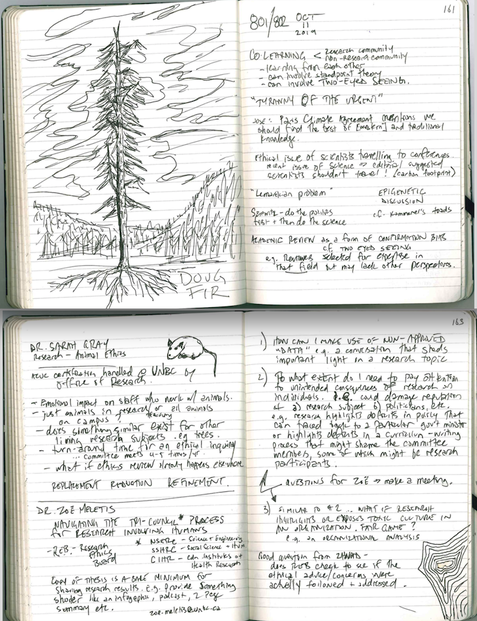There were many compelling themes in this class, from "does fear drive research choices?" to "what role should stakeholders play in research design?" I was interested to learn about some of the ethical constraints that are place on research. These have strong reasons for being in place, but also serve to make certain kinds of research less desirable than others, especially for students and early-career academics who may want to get going quickly on research projects. I am intrigued that research that does not involve humans or animals does not require ethical review. Might this change in the future? Surely there are areas of research that have serious implication for humans, where the research results may shed light on a problem or perhaps expose groups of people to some form of harm, job loss, a devaluing of a culture, collapse of markets, and so on. For example, convincing research on the case for a particular geoengineering technology to be used to impact the atmosphere could lead to a dramatic shift in the agricultural potential in a specific region. The people who live there, do they have a voice in this research? Perhaps all research should undergo an initial ethical review, and the ones that meet the threshold for an assessment move into the queue for further scrutiny.
The presentations/Q&A by Dr. Sarah Gray and Dr, Zoe Meletis were excellent. Their goal, to remove fear of (and in) the ethics review process, was met. Here are the question I had after Zoe's session:
The presentations/Q&A by Dr. Sarah Gray and Dr, Zoe Meletis were excellent. Their goal, to remove fear of (and in) the ethics review process, was met. Here are the question I had after Zoe's session:
- How can or should I make use of non-approved "data," for example, a conversation had by chance that sheds important light on a research topic, perhaps even changing the direction of research?
- To what extent do I need to pay attention to unintended consequences of research on individual, i.e. research that might have the potential, even in a round-about way, to damage the reputation of research subjects or politicians (who are "fair game" for certain kinds of exposure)? For example, research may highlight deficits in policy that can be traced back to a particular government minister of highlights deficits in a curriculum writing process that might shame the committee members, some of whom may also be research subjects.
- If I were tyring to get interviews or gather data from these curriculum team members, do I just need their permission or do I need permission from the folks that commissioned their work (the Ministry of Education) or the people who picked them to sit on the committee (BCTF)?
- What if research highlights or exposes toxic culture in a organization... is this fair game? For example, an organizational analysis can often highlight problems, questionable practices, and so on. These are connected to individuals. Exposing the problem might be tantamount to shaming people.
- As an employee of a school district, I am obligated to respect our collective agreement with the employer. One of the items in our contract relates to maintaining confidence in the public education system and refraining from any comments that would undermine public education. Would exposing problematic areas of curriculum design (see #2 above) be seen as undermining public education?

 RSS Feed
RSS Feed